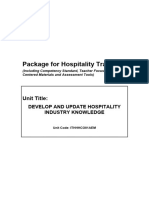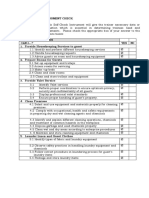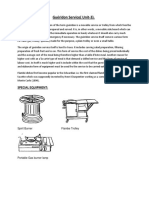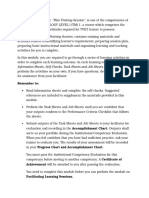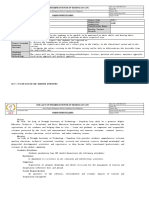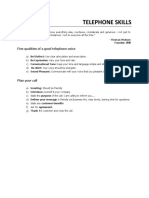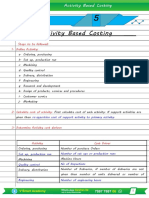0 ratings0% found this document useful (0 votes)
52 viewsPlan & Establish Systems and Procedures
Plan & Establish Systems and Procedures
Uploaded by
Marcia Blake-ClarkeThis document outlines the importance of systems and procedures for businesses and the manager's role in developing, monitoring, and improving them. It discusses how systems and procedures can help with quality control, problem solving, consistency, compliance with laws, training staff, and making operations more efficient. The manager's job is to constantly identify ways to improve by streamlining steps, eliminating duplication, reducing time and costs. The document provides steps for establishing requirements and identifying problems, including clarifying the work purpose, getting personal feedback, and creating a culture of continuous improvement with staff involvement.
Copyright:
© All Rights Reserved
Available Formats
Download as DOCX, PDF, TXT or read online from Scribd
Plan & Establish Systems and Procedures
Plan & Establish Systems and Procedures
Uploaded by
Marcia Blake-Clarke0 ratings0% found this document useful (0 votes)
52 views3 pagesThis document outlines the importance of systems and procedures for businesses and the manager's role in developing, monitoring, and improving them. It discusses how systems and procedures can help with quality control, problem solving, consistency, compliance with laws, training staff, and making operations more efficient. The manager's job is to constantly identify ways to improve by streamlining steps, eliminating duplication, reducing time and costs. The document provides steps for establishing requirements and identifying problems, including clarifying the work purpose, getting personal feedback, and creating a culture of continuous improvement with staff involvement.
Original Description:
PLAN AND ESTABLISH SYSTEMS AND PROCEDURES
Copyright
© © All Rights Reserved
Available Formats
DOCX, PDF, TXT or read online from Scribd
Share this document
Did you find this document useful?
Is this content inappropriate?
This document outlines the importance of systems and procedures for businesses and the manager's role in developing, monitoring, and improving them. It discusses how systems and procedures can help with quality control, problem solving, consistency, compliance with laws, training staff, and making operations more efficient. The manager's job is to constantly identify ways to improve by streamlining steps, eliminating duplication, reducing time and costs. The document provides steps for establishing requirements and identifying problems, including clarifying the work purpose, getting personal feedback, and creating a culture of continuous improvement with staff involvement.
Copyright:
© All Rights Reserved
Available Formats
Download as DOCX, PDF, TXT or read online from Scribd
Download as docx, pdf, or txt
0 ratings0% found this document useful (0 votes)
52 views3 pagesPlan & Establish Systems and Procedures
Plan & Establish Systems and Procedures
Uploaded by
Marcia Blake-ClarkeThis document outlines the importance of systems and procedures for businesses and the manager's role in developing, monitoring, and improving them. It discusses how systems and procedures can help with quality control, problem solving, consistency, compliance with laws, training staff, and making operations more efficient. The manager's job is to constantly identify ways to improve by streamlining steps, eliminating duplication, reducing time and costs. The document provides steps for establishing requirements and identifying problems, including clarifying the work purpose, getting personal feedback, and creating a culture of continuous improvement with staff involvement.
Copyright:
© All Rights Reserved
Available Formats
Download as DOCX, PDF, TXT or read online from Scribd
Download as docx, pdf, or txt
You are on page 1of 3
1
Plan & Establish Systems and Procedures
THHGGA08BSession 1
2 Objectives Today Introduce outline for unit
Establish timelines for assessments Plan and develop systems and
procedures
3 Unit competencies Identify need for Enterprise Systems and
Procedures
Plan and develop S&P Identify problem areas and take action
Development and revision of systems
4 Assessments: Project Case Study
Due dates – Discuss this referring to roster
5 At the end of this session you should be able to:
Define systems and procedures Explain the benefits of using S & P
Understand and explain your role as a manager of S&P Identify S&P
requirements Identify problems
6 Systems System – an arrangement or combination of interrelated and
interdependent things or parts that form a whole. Inputs: people,
equipment, capital, materials, technology, information Process:
activities, workflow, work methods and procedures Outputs: final
services, information, results
7 Procedures Procedure – a series of ordered steps used to get a job
done or to solve a problem Standard Operating Procedures
(SOP’s)Particular process or standard for every task Used for quality
control and consistency Other Procedures Not as prescriptive, a series
of steps but discretionary
8 Your Role You will be expected to manage existing systems, monitor
and review them and occasionally, set up new systems. You will need to
develop, monitor and adjust procedures These entail you having an in-
depth understanding of these to the degree of being able to explain,
teach, analyse and motivate staff in the use of S & P’s.
9 Why is this a skill you should learn and develop?
Help w/ Quality Control – examples? Assist w/ Problem Solving –
example? Ensure Consistency – How? Ensure legislative requirements
(laws) are adhered to – example? Used to quickly train staff – How?
Lower response and delivery time – How? Generally to make things
much more efficient and effective Group exercise w/ white board.
Headings on board ‘Systems’ and ‘Procedures’ Get class to give
examples for each and the significance/use of the examples
10 Identifying Requirements and Problems
Your job as a manager is to constantly identify if something can be
done better, faster or at less cost. How can you do this? Cut out
unnecessary steps Avoid duplication of effort Reduce time to
accomplish tasks Avoid workplace accidents Reduce cost by not using
so many materials Etc. Examples?
11 Steps to establish S & P requirements and identify problems: 1
Steps to establish S & P requirements and identify problems: 1. Clarify
the purpose of the work What is the purpose of the S or P? eg. Set up
the restaurant for breakfast. What are your objectives? – eg. Two staff
to do this in half an hour. What standards do you want to set? Eg. Table
setting, distance between, etc. Each student to give another example
with these headings
12 2. Personal Feedback – identify requirements and problems by
‘walking the job’
Observe but beware of being ‘too familiar’ with the workplace to see
the problems. Ask your staff ‘Lead and manage people’ – (good
communication skills)Important: identify the real problem or issue
otherwise your solution will not work!
13 3. Create an Environment of Continuous Improvement
Engage in a never-ending search for improved quality, faster response,
lower costs, etc. Be strict, but not to the detriment of your development
!Get your staff to be part of the process – instill pride and
understanding – tell them ‘WHY’ and the benefits for them, the
customers and the org.
14 Case Study Barry & Maureen’s B&B
You might also like
- Vendor Qualification Flow ChartDocument1 pageVendor Qualification Flow ChartGanesh V Gaonkar100% (1)
- U12601 Prepare and Clear Tables and Service AreasDocument11 pagesU12601 Prepare and Clear Tables and Service AreasAshli GrantNo ratings yet
- Welcome!: SITXCCS002A Provide Quality Customer ServiceDocument32 pagesWelcome!: SITXCCS002A Provide Quality Customer ServiceRifki JuliNo ratings yet
- Managerial Akuntansi Hansen MowenDocument22 pagesManagerial Akuntansi Hansen Mowenria susanti100% (2)
- Promote Products and Services To Customers: D2.TCC - CL1.08 Assessor ManualDocument56 pagesPromote Products and Services To Customers: D2.TCC - CL1.08 Assessor ManualPhttii phttiiNo ratings yet
- Conducting MeetingsDocument10 pagesConducting Meetingswajid AliNo ratings yet
- ITHHHCO01AEM-Develop and Update Hospitality Industry KnowledDocument59 pagesITHHHCO01AEM-Develop and Update Hospitality Industry KnowledBunda RinaNo ratings yet
- Types of EventsDocument5 pagesTypes of EventsChristopher AlcobaNo ratings yet
- 7790 Process Incoming and Outgoing Telephone Calls - LGDocument46 pages7790 Process Incoming and Outgoing Telephone Calls - LGRose TshidiNo ratings yet
- Lg-Itccor0021a Health and SafetyDocument25 pagesLg-Itccor0021a Health and SafetySabrena FennaNo ratings yet
- Activity C - Case Studies SITXCOM005Document4 pagesActivity C - Case Studies SITXCOM005Pahn PanrutaiNo ratings yet
- TM Develop & Update Tour Ind Knowledge 310812Document82 pagesTM Develop & Update Tour Ind Knowledge 310812Phttii phttii100% (1)
- 457 Fact Sheet - PastrycookDocument3 pages457 Fact Sheet - PastrycookRommel ReyesNo ratings yet
- Manage Responsible Service of Alcohol v2 A PR 15-1 SPDocument5 pagesManage Responsible Service of Alcohol v2 A PR 15-1 SPTiara Niken ANo ratings yet
- Interact With CustomersDocument35 pagesInteract With CustomersMarguerita SotiriouNo ratings yet
- Housekeepingnciii Core 1 Supervise Room Cleaning Maintenance RequirementDocument86 pagesHousekeepingnciii Core 1 Supervise Room Cleaning Maintenance RequirementShaiLa Mài Lā100% (1)
- Monitor Work OperationsDocument31 pagesMonitor Work OperationsShane BrownNo ratings yet
- Innovation, Creativity, and Entrepreneurship Quiz (2 Hours)Document4 pagesInnovation, Creativity, and Entrepreneurship Quiz (2 Hours)Ob 1No ratings yet
- Operate A Computerised Reservations Syst RefinedDocument95 pagesOperate A Computerised Reservations Syst RefinedMark CoachNo ratings yet
- TRAINING PLAN Front Office NC 2 RevisionDocument74 pagesTRAINING PLAN Front Office NC 2 RevisionKhenna DuranNo ratings yet
- Communicate On The Telephone: D1.HRS - CL1.04 D1.HOT - CL1.07 D2.TCC - CL1.05 Trainee ManualDocument60 pagesCommunicate On The Telephone: D1.HRS - CL1.04 D1.HOT - CL1.07 D2.TCC - CL1.05 Trainee Manualbalj balhNo ratings yet
- Develop and Update Hospitality Industry KnowledgeDocument37 pagesDevelop and Update Hospitality Industry KnowledgeGeorgia Grant100% (2)
- A Presentation On Inventory and StorageDocument14 pagesA Presentation On Inventory and StorageJermaine Peart100% (1)
- Roster Staff QuestionsDocument4 pagesRoster Staff QuestionsTinaNo ratings yet
- TM Provide Room Service FinalDocument62 pagesTM Provide Room Service FinalEmiliano PanilanNo ratings yet
- TM Develop Update Local Knowledge 310812 PDFDocument72 pagesTM Develop Update Local Knowledge 310812 PDFKarl VillarubiaNo ratings yet
- AM - Provide Advice To Patrons On F - B SvcsDocument62 pagesAM - Provide Advice To Patrons On F - B SvcsDawn Serafin UrbitaNo ratings yet
- Houskeeping SupervisoryDocument8 pagesHouskeeping SupervisoryDaian Joy Tubio TagalogNo ratings yet
- Clean Public Afreas, Facilities and EquipmntDocument45 pagesClean Public Afreas, Facilities and EquipmntNickolodian AsuncionNo ratings yet
- Communicate in English On The Telephone: D1.LAN - CL10.04 Assessor ManualDocument44 pagesCommunicate in English On The Telephone: D1.LAN - CL10.04 Assessor ManualAmy Amper Pelenio-LofrancoNo ratings yet
- Unit 27: Contemporary GastronomyDocument5 pagesUnit 27: Contemporary Gastronomychandni08100% (1)
- CORE1CBLMDocument65 pagesCORE1CBLMMary Joy RellonNo ratings yet
- ModuleDocument211 pagesModulemmammerNo ratings yet
- Unit 5Document14 pagesUnit 5Just TinNo ratings yet
- Front Office Midterm ActivitiesDocument2 pagesFront Office Midterm ActivitiesJoylyns DalidaNo ratings yet
- Provide Gueridon ServiceDocument27 pagesProvide Gueridon ServiceRenardo Prime50% (2)
- BSBWOR203 - Work Effectively With Others Worksheets: Section 1: Develop Effective Workplace RelationshipsDocument6 pagesBSBWOR203 - Work Effectively With Others Worksheets: Section 1: Develop Effective Workplace RelationshipsPitaram PanthiNo ratings yet
- Manage Intoxicated Persons PR 21-1 SPDocument5 pagesManage Intoxicated Persons PR 21-1 SPFriti FritiNo ratings yet
- Tna - HKDocument5 pagesTna - HKSourish GangulyNo ratings yet
- LG Thhcor0011aDocument49 pagesLG Thhcor0011asaphina100% (3)
- TG - Apply Safety Proc Handling Food - FN - 020114Document198 pagesTG - Apply Safety Proc Handling Food - FN - 020114Hershell ContaNo ratings yet
- Provide A Link Between Kitchen and Service Area: D1.HBS - CL5.09 Trainee ManualDocument74 pagesProvide A Link Between Kitchen and Service Area: D1.HBS - CL5.09 Trainee ManualwindiNo ratings yet
- First Time Trainer PDFDocument186 pagesFirst Time Trainer PDFSilvia Palasca100% (1)
- EdPM-624 Strategic & Project PlanningDocument256 pagesEdPM-624 Strategic & Project Planningfeleke_yeshitilaNo ratings yet
- UNIT-3 Gueridon Service PDFDocument4 pagesUNIT-3 Gueridon Service PDFTejasNo ratings yet
- CORE 5 Clean Public Areas, Facilities and EquipmentDocument30 pagesCORE 5 Clean Public Areas, Facilities and EquipmentKAREN CLAIRE GOMANANo ratings yet
- Work in A Socially Diverse Environment: D1.HRS - CL1.19 D1.HOT - CL1.02 D2.TCC - CL1.02 Assessor ManualDocument36 pagesWork in A Socially Diverse Environment: D1.HRS - CL1.19 D1.HOT - CL1.02 D2.TCC - CL1.02 Assessor ManualKhunlong Cha100% (1)
- Communication On The Telephone InfoDocument30 pagesCommunication On The Telephone Infomelese100% (1)
- Work Effectively With ColleaguesDocument6 pagesWork Effectively With ColleaguesDading QalbuadiNo ratings yet
- Transcript of HOUSEKEEPING ORGANIZATION STRUCTUREDocument20 pagesTranscript of HOUSEKEEPING ORGANIZATION STRUCTUREYataki Lrak AilaludNo ratings yet
- How To Use CBLM in Housekeeping NciiDocument1 pageHow To Use CBLM in Housekeeping NciiJeruS.Ababon100% (6)
- Briefing Points For Industrial TrainingDocument28 pagesBriefing Points For Industrial TrainingYash ChhabraNo ratings yet
- Converse in English - DOCUMENTDocument88 pagesConverse in English - DOCUMENTNuttapong RutamornchaiNo ratings yet
- BC09 Ensure A Healthy and Safe Learning EnvironmentDocument36 pagesBC09 Ensure A Healthy and Safe Learning Environmentaazul214No ratings yet
- FBS Performance Task No. 4Document1 pageFBS Performance Task No. 4Jellane SeletariaNo ratings yet
- Conversation Making ReservationDocument3 pagesConversation Making ReservationMike AntonioNo ratings yet
- Our Lady of Triumph Institute of Technology, IncDocument14 pagesOur Lady of Triumph Institute of Technology, IncEdgar Junior PahonangNo ratings yet
- Certificate II Food and Beverage ServiceDocument6 pagesCertificate II Food and Beverage ServiceMahendran SubramaniamNo ratings yet
- Perform Basic First Aid Procedures: D1.HRS - CL1.12 D1.HOT - CL1.12 D2.TCC - CL1.15 Trainee ManualDocument62 pagesPerform Basic First Aid Procedures: D1.HRS - CL1.12 D1.HOT - CL1.12 D2.TCC - CL1.15 Trainee ManualliisdewNo ratings yet
- Telephone Skills: Five Qualities of A Good Telephone VoiceDocument7 pagesTelephone Skills: Five Qualities of A Good Telephone VoiceNikhil BNo ratings yet
- Managing the Training Function For Bottom Line Results: Tools, Models and Best PracticesFrom EverandManaging the Training Function For Bottom Line Results: Tools, Models and Best PracticesRating: 3 out of 5 stars3/5 (1)
- Marketing Management PPT by Akshaya KumarDocument12 pagesMarketing Management PPT by Akshaya KumarAkshaya KumarNo ratings yet
- The Marketing Environment - Contemporary Issues & Principles of MarketingDocument162 pagesThe Marketing Environment - Contemporary Issues & Principles of MarketingCyrine bouzaidiNo ratings yet
- 1 2020 General Prospectus With CoverDocument271 pages1 2020 General Prospectus With CoverChris WebbNo ratings yet
- Competitive Brand AuditDocument5 pagesCompetitive Brand Auditkashan qamarNo ratings yet
- 438.audit Plan 1st Renewal Insani Baraperkasa ISO 9001 2015Document5 pages438.audit Plan 1st Renewal Insani Baraperkasa ISO 9001 2015Un'galluNo ratings yet
- A Guide To Board EvaluationDocument176 pagesA Guide To Board EvaluationABC 123No ratings yet
- Key Account Management Case Study Insights 1Document10 pagesKey Account Management Case Study Insights 1Sourabh DixitNo ratings yet
- ICBA V1-0 Print MasterDocument88 pagesICBA V1-0 Print MastermeghaliNo ratings yet
- Togaf IrsDocument42 pagesTogaf IrsAlejandro CamarenaNo ratings yet
- HRMP - Session 4 - Human Resource PlanningDocument13 pagesHRMP - Session 4 - Human Resource PlanningviewpawanNo ratings yet
- Evolution of Management Thinking: Leaderships and Management in Tvet MBE22603Document51 pagesEvolution of Management Thinking: Leaderships and Management in Tvet MBE22603Faritz ShufflerNo ratings yet
- Get Certified As An ISO 31000 Risk Manager To Advance Your SkillsDocument2 pagesGet Certified As An ISO 31000 Risk Manager To Advance Your SkillsGSDC CouncilNo ratings yet
- Nestle's ERP OdysseyDocument8 pagesNestle's ERP OdysseyPrateek ShrivastavaNo ratings yet
- Nancy J. Adler - Cross Cultural Management - Issues To Be FacedDocument40 pagesNancy J. Adler - Cross Cultural Management - Issues To Be Facedcjcp04No ratings yet
- RR AbcDocument4 pagesRR AbcNikitaa SanghviNo ratings yet
- Supply Chain Managment Chap 124Document104 pagesSupply Chain Managment Chap 124phươngNo ratings yet
- Garrison 14e - Chapter 1 LectureDocument4 pagesGarrison 14e - Chapter 1 LectureNam PhamNo ratings yet
- Zitech PLC ProcessDocument1 pageZitech PLC Processsandeep5No ratings yet
- Overview of Management AccountingDocument6 pagesOverview of Management AccountingRenz Francis LimNo ratings yet
- Implementing Total Quality Management in Construction Firms PDFDocument8 pagesImplementing Total Quality Management in Construction Firms PDFGabriel PreviattoNo ratings yet
- Senior HSE Advisor in Chennai, TN - HitachiDocument2 pagesSenior HSE Advisor in Chennai, TN - HitachiKhalid NaseemNo ratings yet
- HRM in Retail: Dr. Parveen NagpalDocument23 pagesHRM in Retail: Dr. Parveen NagpalMisbah UllahNo ratings yet
- Swot AnalysisDocument2 pagesSwot Analysisapi-360980791No ratings yet
- SWOT CSR AssignmentDocument3 pagesSWOT CSR AssignmentAreesha MemonNo ratings yet
- Yellow Capstone Elver Alexander Rios NiñoDocument7 pagesYellow Capstone Elver Alexander Rios NiñoAlexander Rios50% (2)
- Never Let Go An Opportunity To Be: FabulousDocument28 pagesNever Let Go An Opportunity To Be: FabulousFarooq AhmedNo ratings yet
- JanathaDocument24 pagesJanathasreyaanoop2005No ratings yet
- Madurai Kamaraj University: Refresher Course in Business Studies& CommerceDocument35 pagesMadurai Kamaraj University: Refresher Course in Business Studies& Commercechanus92No ratings yet







